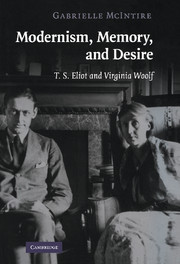Book contents
- Frontmatter
- Contents
- Illustration
- Acknowledgments
- Introduction
- 1 An unexpected beginning: sex, race, and history in T. S. Eliot's Columbo and Bolo poems
- 2 Mixing memory and desire: rereading Eliot and the body of history
- 3 Eliot, eros, and desire: “Oh, do not ask, ‘What is it?’”
- 4 T. S. Eliot: writing time and blasting memory
- 5 Virginia Woolf, (auto)biography, and the eros of memory: reading Orlando
- 6 Other kinds of autobiographies: sketching the past, forgetting Freud, and reaching the lighthouse
- 7 Remembering what has “almost already been forgotten”: where memory touches history
- Epilogue
- Notes
- Index
5 - Virginia Woolf, (auto)biography, and the eros of memory: reading Orlando
Published online by Cambridge University Press: 22 September 2009
- Frontmatter
- Contents
- Illustration
- Acknowledgments
- Introduction
- 1 An unexpected beginning: sex, race, and history in T. S. Eliot's Columbo and Bolo poems
- 2 Mixing memory and desire: rereading Eliot and the body of history
- 3 Eliot, eros, and desire: “Oh, do not ask, ‘What is it?’”
- 4 T. S. Eliot: writing time and blasting memory
- 5 Virginia Woolf, (auto)biography, and the eros of memory: reading Orlando
- 6 Other kinds of autobiographies: sketching the past, forgetting Freud, and reaching the lighthouse
- 7 Remembering what has “almost already been forgotten”: where memory touches history
- Epilogue
- Notes
- Index
Summary
And I find myself again in the old driving whirlwind of writing against time. Have I ever written with it? But I vow I won't spend longer at Orlando, which is a freak; it shall come out in September, though the perfect artist would revoke & rewrite & polish – infinitely. But hours remain over to be filled with reading something or other – I'm not sure what … And yet the only exciting life is the imaginary one.
Virginia Woolf, Diary, 21 April 1928That would be a glorious life, to addict oneself to perfection; to follow the curve of the sentence wherever it might lead, into deserts, under drifts of sand, regardless of lures, of seductions; to be poor always and unkempt; to be ridiculous in Piccadilly.
Virginia Woolf, Neville in The WavesVirginia Woolf begins the biographic meditation that is Orlando with a fascinating claim for our pairing of memory and desire: after the narrator rejoices in Orlando's beauty, remarking that his “face, as he threw the window open, was lit solely by the sun itself,” he continues, “Happy the mother who bears, happier still the biographer who records the life of such a one!” In a text that is more than half a flirtatious homage to the “real-life” Vita Sackville-West, Woolf here draws analogies between herself and Orlando/Vita's mother, between birthing and writing a life, and between biological labor and the eros of the letter.
- Type
- Chapter
- Information
- Modernism, Memory, and DesireT. S. Eliot and Virginia Woolf, pp. 119 - 146Publisher: Cambridge University PressPrint publication year: 2008



